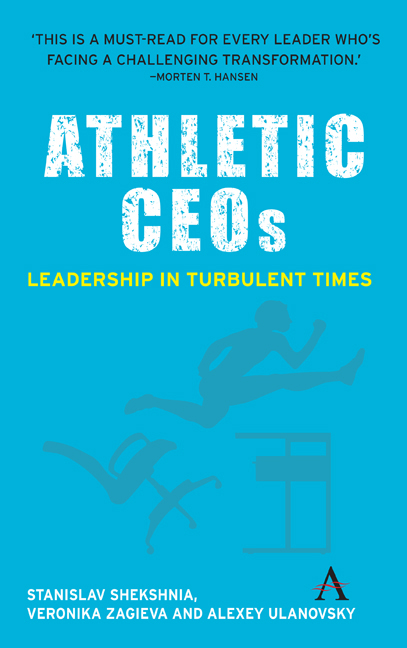Book contents
- Frontmatter
- Contents
- List of Illustrations
- Introduction
- 1 Athletic Leadership Explained
- 2 The Agenda and Practices of Athletic Leaders
- 3 Effectiveness of Athletic Leadership: Outputs and Outcomes
- 4 Vitaly Saveliev: Passion and Innovation at the Old Airline
- 5 Eugene Kaspersky: Saving the World
- 6 Alexander Dyukov: Quiet Transformation of Gazprom Neft
- 7 Herman Gref at Sberbank: Entrepreneurship in the Least Likely Place
- 8 Athletic Leadership in Other Regions: Roger Agnelli, Dong Mingzhu and Jeff Bezos
- 9 Athletic Leadership for Non-Athletes
- Appendix Research Methodology
- Index
Appendix - Research Methodology
- Frontmatter
- Contents
- List of Illustrations
- Introduction
- 1 Athletic Leadership Explained
- 2 The Agenda and Practices of Athletic Leaders
- 3 Effectiveness of Athletic Leadership: Outputs and Outcomes
- 4 Vitaly Saveliev: Passion and Innovation at the Old Airline
- 5 Eugene Kaspersky: Saving the World
- 6 Alexander Dyukov: Quiet Transformation of Gazprom Neft
- 7 Herman Gref at Sberbank: Entrepreneurship in the Least Likely Place
- 8 Athletic Leadership in Other Regions: Roger Agnelli, Dong Mingzhu and Jeff Bezos
- 9 Athletic Leadership for Non-Athletes
- Appendix Research Methodology
- Index
Summary
Originally this book was planned as a sequel to The New Russian Business Leaders (Kets de Vries, M. F. R., Shekshnia S., Korotov K. and Florent-Treacy E., 2004). We wanted to see how the Russian business leadership landscape had evolved during the ensuing decade.
Our first finding was that the country's business context had undergone tremendous changes. On the one hand the Russian economy had caught up with the rest of the world during the growth years of the early 2000s, and global trends – such as digitalization, knowledge obsolescence, turbulence, climate change, terrorism and others – had made a much stronger impact on the work of Russian business leaders than previously. On the other hand Russia as a country had become more assertive in international affairs, more nationalistic and more protectionist. The role – and the direct participation – of the government in regulating the economy had increased dramatically. The crisis of 2008– 9 was a strong blow to the Russian economy and only reinforced the government's activism.
These discoveries sharpened the focus of our research: we decided to find out what kind of leadership produces superior results in this turbulent context with its heavy government participation. Specifically, we wanted to address the following research questions:
Which Russian companies achieved exceptional results during the turbulent period of 2009– 16?
What was the role of the leaders (CEOs) of these companies in assuring this performance?
What personal and behavioural characteristics of the CEOs enabled this leadership?
What do the leaders of these companies have in common?
We also wanted to examine complex organizations with sustainable superior financial performance, which were leaders in their industries in Russia and competitive globally. We looked at the performance of the 160 largest Russian businesses from 2003 to 2013 and selected a list of eight CEOs: Herman Gref (Sberbank), Vitaly Saveliev (Aeroflot), Alexander Dyukov (Gazprom Neft), Eugene Kaspersky (Kaspersky Lab), Oleg Bagrin (NLMK), Sergey Frank (Sovcomflot), Oleg Tinkov (Tinkoff Bank) and Sergey Galitsky (Magnit). Since we wanted to apply a clinical methodology, we had to choose people who were willing to spend time with researchers and allow access to their companies.
- Type
- Chapter
- Information
- Athletic CEOsLeadership in Turbulent Times, pp. 195 - 198Publisher: Anthem PressPrint publication year: 2018



